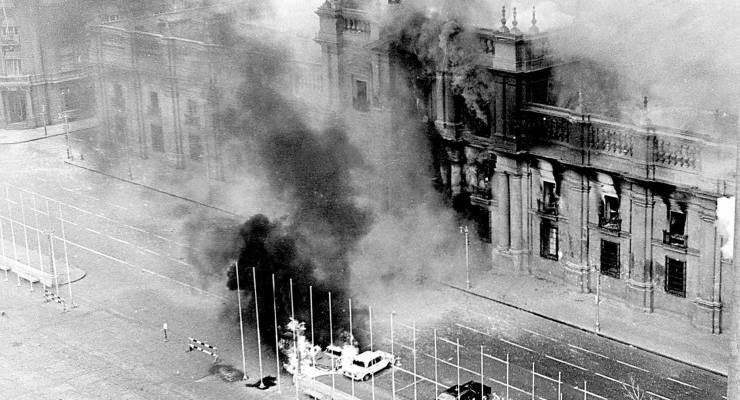
Spy agencies argued at an Administrative Appeals Tribunal hearing yesterday that disclosing material documenting their role in the 1973 Chile coup would harm Australia’s international relations and national security.
As Crikey reported on Tuesday the tribunal is hearing evidence in an application by a University of New South Wales international relations professor to get documents about the Australian Secret Intelligence Service’s (ASIS) involvement in Chile during the 1970s.
Professor Clinton Fernandes began presenting his case yesterday. He explained his application did not seek to name specific agents, but aimed to understand the nature of Australia’s involvement.
The public submissions made by the agencies, meanwhile, give little justification for why the material is kept secret. And their evidence is largely kept secret because Attorney-General Michaelia Cash issued a public interest certificate on national security grounds at their request. The evidence given publicly is incomplete, and refers heavily to the secret material.
Department of Foreign Affairs and Trade deputy secretary Tony Sheehan, who previously worked for ASIO, submitted that the disclosure had a “real risk of damaging Australia’s security and international relations” but would elaborate only in confidential evidence.
“In seeking to explain how the risk of damage arises, it is necessary for me to directly or indirectly reveal the very information about which I am concerned,” he wrote.
“Jack Lowe”, an ASIS officer giving evidence under an assumed name, produced an affidavit which did little more than explain the role of ASIS. Historical information could damage national security by giving foreign powers “insights into ASIS’s areas of interests, methods and capabilities”, and detailing the number and type of personnel deployed in a particular situation.
Attached to Lowe’s affidavit is text of a speech by former ASIS chief Nick Warner and material on the history of the agency.
Former ASIO deputy director “Peter Darby”, also operating under an assumed name, provided a generic affidavit highlighting the need for the organisation to operate under “the strictest possible secrecy”. Much of it focuses on the need to protect the identities of current and former intelligence officers.
He also suggested disclosure of some of the exempted material would “reveal the existence of relationships, including the nature and extent of these relationships, between ASIO and foreign countries and/or their intelligence services”.
The relationship with the United States and the CIA, however, is pretty well documented. Darby does little to explain why, after nearly 50 years, this information would be so damaging.
All three affidavits referred to “mosaic analysis”, by which foreign intelligence services may piece together disparate, seemingly innocuous, pieces of information about our spooks to gain a strategic security advantage.
But any information on who would do this — and how information from the 1970s might be used to undermine Australia’s national security and foreign relations in 2021 — is in the confidential affidavits.
The hearing continues today, largely in secret.
What are your thoughts? Should this information become public? Write to letters@crikey.com.au, and don’t forget to include your full name if you’d like to be considered for publication.








They’re confusing national security with national embarrassment, and hoping we’re too stupid or too apathetic to care about the difference
They would not be incorrect in that assumption.
USA behind the coup that toppled Whitlam & delivered Fraser too. I suspect he realised this later in life. He advocated strongly for ending the US/Australian military alliance among other things…
Yes, the USA sees the whole world as their “backyard”
When the USA speak of the “hemispheric interests” it means “you got a hemisphere, we’re interested in it“.
As Don Dunstan found out with his Special Branch in SA, they considered themselves loyal to a higher entity than the mere government of the day.
Acton’s axiom about power did not extend to secret power, by definition unaccountable.
Spooks protect us from dragons and, as there are no dragons on the street corner, they must be doing a great job and just need more money & power to do it even better.
Q.E.D.
When it comes to dragons, it’s preferable to use the subjunctive, Banmor. Thus ‘Spooks protect us from dragons and, as there be no dragons on the street corner, they must be doing a great job and just need more money & power to do it even better.’
“Preferable” in what sense? In that context, the subjunctive just sounds weird – possibly even semi-literate. It is also probably not correct – the subjunctive is used in cases of uncertainty, but the fact that there are no dragons, doesn’t fit that category. Admittedly, I know more about the subjunctive in Spanish than in English, so I could be completely wrong about that.
In what sense?? Why, as a pirate, of course!
If our spooks haven’t drastically changed their MO since Billy McMahon was PM (Gawd it hurts to remember that was a thing), 49 years since Gough got us out of Vietnam and recognised the PRC, and 47 years since the Hope Royal Commission pulled Menzies’ ASIO to pieces then we don’t stand a chance in 2021, and not just because we have the most incompetent government since 1971 (see above)…
When I visited Caracas some years ago, there was a museum dedicated to illustrating the illegal overthrow of Allende. The Venezuelans under Chavez viewed Allende as a significant historical figure in the fight for justice and equality. There is no doubt that the US as part of their “we will not tolerate socialism” policy, were heavily involved and it no surprise that our spooks were used as puppets by the US.
Aaaah..the old rules based order !.;-)
Which gave Chile – and the world – Pinochet.
And Pinochet gave Australia a bunch of “exiliados” – exiled Chileans